2 Volumes
Quaker Philadelphia 1683-1776
New volume 2012-11-21 17:33:18 description
Surviving Strands of Quakerism
Of the original thirteen, there were three Quaker colonies, all founded by William Penn: New Jersey first, Pennsylvania biggest, and Delaware so small Quakerism was overcome by indigenous Dutch and Swedes.
Where Quakers Lived.Pennsylvania
New topic 2016-10-29 15:13:21 description
Pennsbury Manor
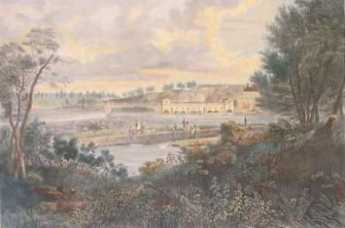
|
| Fairmount |
William Penn once had his pick of the best home sites in three states, because of course he more or less owned all three (states, that is). Aside from Philadelphia townhouses, he first picked Faire Mount, where the Philadelphia Art Museum now stands. For some reason, he gave up that idea and built Pennsbury, his country estate, across the river from what is now Trenton. It's in the crook of a sharp bend in the river but is rather puzzlingly surrounded by what most of us would call swamps. The estate has been elegantly restored and is visited by hosts of visitors, sometimes two thousand in a day. On other days it is deserted, so it's worth telephoning in advance to plan a trip.
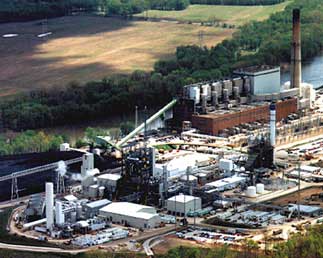
|
| Gasified Garbage |
After World War II, a giant steel plant was placed nearby in Morrisville, thriving on shiploads of iron ore from Labrador, but now closed. Morrisville had a brief flurry of prosperity, now seemingly lost forever. However, as you drive through the area you can see huge recycling and waste disposal plants, and you can tell from the verdant soil heaps that the recycled waste is filling in the swamps. It doesn't take much imagination to foresee swamps turning into lakes surrounded by lawns, on top of which will be many exurban houses. How much of this will be planned communities and how much simply sold off to local developers, surely depends on the decisions of some remote corporate Board of Directors.
However, it's intriguing to imagine the dreams of best-case planners. Radiating from Pennsbury, there are two strips of charming waterfront extending for miles, north to Washingtons Crossing, and West to Bristol. If you arrange for a dozen lakes in the middle of this promontory, surround them with lawns nurtured by recycled waste, you could imagine a resort community, a new city, an upscale exurban paradise, or all three combined. It's sad to think that whether this happens here or on the comparable New Jersey side of the river depends on state taxes. Inevitably, that means that lobbying and corruption will rule the day and the pace of progress.
Meanwhile, take a trip from Washingtons Crossing to Bristol, by way of Pennsbury. It can be done in an hour, plus an extra hour or so to tour Penn's mansion if the school kids aren't there. Add a tour of Bristol to make it a morning, and some tours of the remaining riverbank mansions, to make a day of it.
WILLIAM BLATHWAYT'S DRAFT OF THE CHARTER OF PENNSYLVANIA
Charles the Second, by the grace of [God] King of England, Scotland, France, and Ireland, Defend[er] of the Faith & Co. To all to whom these presents shall come, greeting.
Whereas our truste[d] and well beloved subject William Penn Esquire, sonne and heire of Sir William Penn, deceased, out of a comendable desire to enlarge our English Empire and promote such usefull comodities as may be of benefit to us and our dominions, as also to reduce the Savage Natives by Gentle and just manners to the Love of civill Society and Christian Religion, hath humbly besought leave of us to transport an ample Colony unto a certaine Country hereinafter described in the parte of America not yet cultivated and planted. And hath likewise humbly besought our Royall Ma[jes]tie to give, grant, and confirme all the said Country with certaine priviledges and Jurisdicions requisite for the good government and safety of the said Country and Colony, to him and his heires for ever. Know yee therefore that wee, favoring the petition and good purpose of the said William Penn, and haveing regard to the memory and merits of his late Father in diverse services and particularly to his conduct, courage, and dircctione {discretion} under our dearest Brother James, Duke of Yorke, in that signall Battle and Victorie fought and obtained against the Dutch Fleet comanded by [illegible word deleted] {The}2 Heer Van Obdam in the yeare 1653. In consideration thereof of our speciall grace, certaine knowledge, and meere motion have given and granted and by this our present Charter for us our heires and successors, doe give and grant unto the said William Penn his heires and Assignes
All that Tract or part of Land of {in}4 America with all the Islands therein contained as the same is bounded on the East by Delaware River from Twelve miles distance Northwards of Newcastle Towne unto the Three and Fortieth degree of Northerne Latitude, If the said River doth extend soe farr northwards. But if the said River shall not extend soe farr northward. then by the said River soe farr as it doth extend, and from the Head of the said River, the Eastern-bounds are to be determined by a Meridian Line to bee drawne from the head of the said River unto the said Three and Fortieth degree; The said Lands {to} extend westward Five degrees in longitude to be computed from the said Eastern bounds, and the said Lands to be bounded on the north by the begining of the Three and Fortieth degree of northerne Latitude and on the South by a Circle drawne of {at}5 12 miles distance from Newcastle northwards6 and westwards, unto the begining of the Fortieth degree of northerne Latitude, and then by a streight line westwards to the limit of Longitude above mentioned7
Wee doe alsoe give and grant unto the said William Penn his heires and Assignes The free and undisturbed use and continuance in and passage into and out of all and singular Ports, Harbours, Bayes, Waters, Rivers, Isles and Inletts belonging unto and {or} leading to and from the Country or Islands aforesaid And all the Soyle, Lands, Feilds, woods, underwoods, mountaines, hills, Fenns, Isles , Lakes, Rivers, Waters, Rivuletts, Bayes, and Inletts scituate or being within or belonging unto the Limitts and bounds aforesaid together with the fishing of all sorts of Fish, whales {sturgeons} and all Royall and other Fishes in the Sea, Bayes, Inletts, waters, or Rivers within the premisses and the Fish therein taken And alsoe all veines Mines and Quarries as well discovered, as not discovered, of gold, silver ,gemms and other {pretious} stones and all other whatsoever bee it of stones, mettalls, or of any other thing or matter whatsoever found or to be found within the Country Isles or limitts aforesaid
And him the said
In Witnesse whereof We have caused these Our Letters to be made Patents, Witness Ourselfe at Westm1 the 4th day of March, In the three and Thirtieth yeare of Our Reigne, 1680/180 Pigott81
Note: Footnotes, edits and insertions from Richard P. Dunn and Mary Maples Dunn, "The Papers of William Penn", U. of PA Press, 1982
Clarifying punctuation and emphasis by George Ross Fisher
The Naming of Pennsylvania
On January 5, 1681, William Penn wrote a letter to his friend Robert Turner:
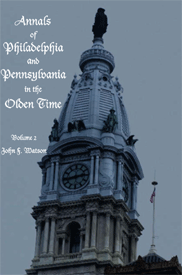
|
| Annals of Pennsylvania |
"This day my country was confirmed to me by the name of Pennsylvania, a name the King would give it, in honor of my father. I chose New Wales, being, as this, a pretty hilly country; but Penn, being Welsh for a head -- as Pennanmoire in Wales, and Penrith in Cumberland, and Penn in Buckinghamshire, the highest land in England, -- they called this Pennsylvania, which is the high or head woodlands, for I proposed (when the Secretary, a Welshman, refused to have it called New Wales), Sylvania, and they added Penn to it; and though I much opposed it and went to the King to have it struck out and altered, he said, 'twas past, and would take it upon him; nor would twenty Guineas move the under Secretaries to vary the name, -- for I feared lest it should be looked on as a vanity in me, and not as a respect in the king, as it truly was, to my father, whom he often mentions with praise."
John F. Watson, the author of what generations have called "Watson's Annuals," goes on to comment:
"If the cause was thus peculiar in its origin, it is not less remarkable in its effect, it being at this day perhaps the only government in existence which possesses the name of its founder."
Watson further makes the footnote: "Penn himself professed to have descended of the house of Tudor, in Wales, one of whom, dwelling on an eminence in Wales, received the name of John Pennunnith. He going afterward to reside in London, took the name of John Penn, i.e. John on the Hill."
William Penn Conducts a Witchcraft Trial
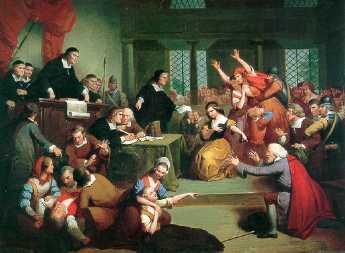
|
| Salem Witch Trials |
When trials for witchcraft are mentioned, most people think of Salem, Massachusetts, where 19 people were hanged as witches and hundreds were imprisoned, in 1692. The Salem trials were apparently provoked by a minister from Barbados, and it is thought the uproar about witches in America was in part related to encountering the spiritualism of the Indian tribes. Whatever its origins, the issue has been in the background for a long time, and occasionally even surfaces today in accusations of "Satanic rituals."
There were trials for witchcraft in New York in 1664, in West Chester in 1672, and in Princess Ann county of Virginia. But the trial of central interest to Pennsylvania occurred in 1683, when Governor Penn presided over it, himself. Pennsylvania had adopted British laws, including one from James I concerning the crime of witchcraft, so Penn probably had little choice but to hold the trial. His fellow judges were his Council; there is little doubt the outcome reflects his opinion.
The accused were two Swedish women, Margaret Mattson and Yeshro Hendrickson, who pleaded not guilty. Numerous witnesses told vague stories, and Mattson's daughter expressed her conviction of her mother being a witch. Governor Penn finally charged the jury, which brought in a memorable verdict. The defendants were found guilty of "having the common fame of a witch" but not guilty in the manner and form.
There are times, and this was one of them, when it is not useful to be overly precise in your meaning.
William Penn: Visionary with Persuasiveness
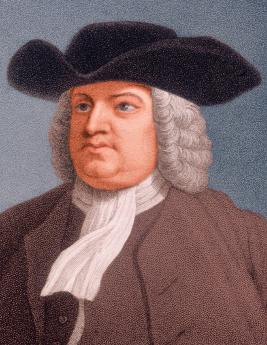
|
| William Penn |
It was a signal and blessed providence which first induced so rare a genius, so excellent and qualified a man as Penn, to obtain and settle such a great tract as Pennsylvania, say 40,000 square miles, as his proper domains. It was a bold conception; and the courage was strong which led him to propose such a grant to himself, in lieu of payments due to his father. He besides manifested the energy and influence of his character in court negotiations, although so unlikely to be a successful courtier by his profession as a Friend, in that he succeeded to attain the grant even against the will and influence of the Duke of York himself who, as he owned New York, desired also to possess the region of Pennsylvania as the right and appendage of his province.
"This memorable event in history, this momentous concern to us, the founding of Pennsylvania, was confirmed to William Penn the Great Seal on the 5th of January, 1681."
-John F. Watson,
Annals of Philadelphia and Pennsylvania in the Olden Time
Foot of Arch Street
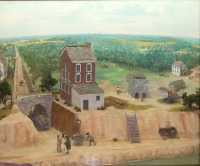
|
| The Foot of Arch St. |
What we now call Arch Street in Philadelphia was originally named Mulberry Street. Just when that change officially occurred could be argued about, but it took its new name from the fact that a road was cut through the high river bank for easier access to riverside shipping, and an overhead arch connected the two cut ends of Front Street at the point of crossing. A model which is still on display in the Friends Meetinghouse at 4th and Arch depicts this arch in place in 1684. The model displays Thomas Holme, Penn's surveyor, and map-maker, pointing up at the arch. It is a matter of record that Thos. Holme owned the property at the corner of Front and Mulberry, so presumably, the red brick house stranded by the newly excavated street was Holmes. By the time of the Revolution, the Arch Street wharf had become the center of Delaware River commerce. The model depicts that even in 1684, Arch Street led straight to the Schuylkill.
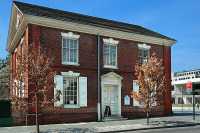
|
| The Free Quaker Meetinghouse |
The cemetery at 4th and Arch, set aside as early as 1684 as a burying yard, is known to contain at least 40,000 unmarked graves, many of them from the yellow fever epidemics of the late 18th Century. The meetinghouse was built right on top of them, a fact which may now offend some visitors. But it was in keeping with the ancient tradition of burying the dead in the consecrated ground of a churchyard, more or less as a sanitation measure. It is also in keeping with the tradition of early Quakers not to allow their pictures to be displayed, or even their names to be placed on tombstones.
When disputes arose about warfare in the Revolutionary War, and many non-Quakers who had been expelled for one reason or another joined with non-Quakers to form the Free Quaker Meeting, it ended up where it is now, at 5th and Arch. The Friends Center, home to the administrative focus of Quakerdom, is at 15th and Cherry, just a partial block from Arch Street. At the time of the construction of the 4th and Arch Meeting, many Quakers moved into the area to be within walking distance, giving rise to the original meaning of the term "North of Market".
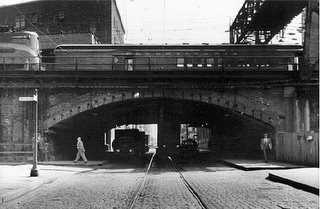
|
| Chinese Wall |
By the time of the Revolution, the Arch Street dock was the commercial heart of town, and the London Coffee House at Front and Market was the thriving center of international gossip. Tradition has it that it was Bradford, the owner of the London Coffee House, who first got the news of the Stamp Act, and started the agitation which famously resulted. The construction of the elevated "Chinese Wall" of the Pennsylvania Railroad along what is now John Kennedy Boulevard, sliced off the Northern side of town as a quiet fashionable place to live for nearly a century. And while the Benjamin Franklin Parkway was intended to correct this situation, it actually finished "North of Market" as even inhabitable. Things are gradually improving, particularly with infusions of public money, but it takes a long time for such urban scars to heal.
Glorious Revolution: Nov. 5, 1688
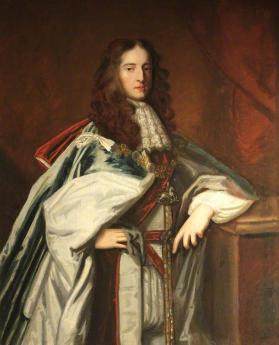
|
| William III of Orange |
The history of William III, or William of Orange, or the William of William and Mary, is mentioned in American history but not much noticed. In academic parlance, it's a topic which probably won't be on the test. By contrast, British schoolboys do learn a lot about Winston Churchill's ancestor the Duke of Marlborough who was William's commander against the French, and also the religious troubles William provoked in Ireland, but Britons mainly seem to express a bewildering relief that religious quarreling in England finally came to an end with the ascension of William and Mary to the throne. What the Irish thought about the same events is apparently just ignored. But what Pennsylvanians (and residents of Delaware and New Jersey, too) should mainly note is that when William came to the British throne, the era of William Penn's special protection by the Monarchy was over. Penn's heirs changed both their style and their religion, and worked hard to be friends of the King; but it was never going to be the same as it had been when Charles II made a promise to William Penn's father on his deathbed, that he would look after the troublesome boy.
The British populace had thought they became a Protestant nation under Henry VIII and solidified that situation under Elizabeth I. But somehow the religious issue violently re-arose under "Bloody" Mary and Cromwell. And even that was not enough; Charles II and his brother James II were secret Catholics, there seemed to be no end to this. An American gets the feeling that the British citizenry was more fed up with wrangling about Royal Religion than so much exercised about its theology. In any event, when James II produced a royal son who would almost certainly be raised a Catholic, it was just too much for most of his subjects. James just had to go.
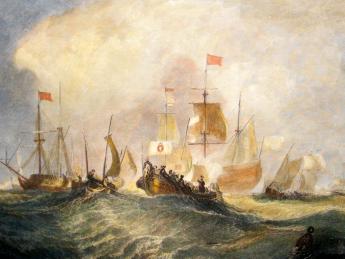
|
| Landing at Torbay |
The most likely Protestant king available was William of Orange, the Dutch king. William himself was eager to have more allies for the Netherlands because the French king Louis XIV was busily swallowing up his weaker neighbors and the Netherlands were probably next. His wife, Mary, was the daughter of James II, so the legitimacy of his line was assured. Urged on by members of the British aristocracy and several powerful members of Parliament, he built a fleet which was alleged to be needed against Algerian pirates and soon set sail for England. Fearing French attack while his troops were in England, William had made extensive alliances in British military circles, and when he arrived he was more or less acclaimed, bloodlessly. For whatever reason, James II put up a very little fight was imprisoned briefly in a way that invited escape and left for France. And so William and Mary were victors in a bluffing game which James did not resist very hard, and were the monarchs of a Protestant nation. However, Ireland was Catholic and resisted, leading to bloody suppression which is still muttered about in Irish taverns, and fought over in Northern Irish elections.
Meanwhile, we all know what was happening to William Penn. He had a stroke, his steward in England and Logan in Pennsylvania "stole him blind", and the greatest private landowner in British history went to debtor's prison. Hardly any of this is imaginable under the Stuart kings. And for that matter, the later behavior of George III is not imaginable under the Stuart kings, either.
John Bartram's Garden
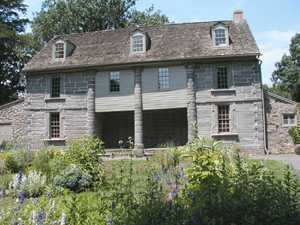
|
| Bartram Gardens |
It's worth a visit to Bartram's Gardens, if only for the astonishment of finding a very large farm and stone Quaker farmhouse within a few blocks of our largest medical center, a stone's throw from the biggest oil refinery on the upper East Coast. And located on the edge of a neighborhood that is, well, past its prime. The trees on the farm are centuries old, so walking around the grounds imparts the feeling of being hundreds of miles from civilization when in fact you are only a hundred yards away from streets that are very urban, indeed. When you turn in certain directions, an occasional skyscraper peeps over treetops, and down the meadows, at the farm's dock on the leafy-banked Schuylkill, you can see oil storage tanks across the river, just a long shot with a 2-iron away. Look upward, to see the upper half of shining towers of Center City.
The farm property as it now stands dates back to 1728, but the site marks the earliest beginnings of the city, nearly a hundred years earlier. The river curves around this hill then snake on down to Delaware through flatlands which were originally swamps ("wetlands", as they say). The hill is as far downriver into malaria territory as the Indians were willing to go, so the Dutch traders had to sail upriver and dock there in order to take thirty or forty thousand fur pelts back to Holland each year. One thing or another has been dumped on the swamps for three hundred years, and the oil companies found it a cheap place to buy enough land for their refineries, close to four or five railroads near Bartram's place, and with access to the high seas. Right now, most of the oil comes from Nigeria, emptying two or so supertankers a week. There has to be enough storage capacity to take care of delays caused by bad weather on the Atlantic, and there has to be access to railroads and highways to carry the finished product away. The rest of a refinery is just thousands of miles of metal pipes, gleaming in the sun.
Sun Oil is trying to be a good neighbor, turning more and more of the area over to nature preserve, as chemical engineers have learned how to work in a smaller space with fewer employees. The banks of the lower Schuylkill are now mostly grown to shrubs and trees, concealing from boat travelers the rather extensive dumps of old auto tires and similar refuse. It's a placid winding trip, increasingly coming to resemble what the Dutch traders once encountered. Especially in May, when the Palomino or Empress trees are in purple bloom. It seems the Chinese packed their porcelains in dried Palomino seed pods, and the discards have grown up to quite a nice display. Logan Square is filled with such trees, quite artfully pruned and maintained; just imagine several miles of the river lined with them, and you can see why the Tourist Bureau is excited about the potential. If you have been to San Antonio you know the potential of an urban river ride, which in this case might go all the way up to the Art Museum. Given enough public response, you can envision two or three-day barge rides from New Castle, Delaware to Pennsbury, with side trips up past Bartram's to the Waterworks. Right now, trips are comparatively limited by the tides, with a few trips a year down from Bartram's to the refineries, and a few more up to the river to the Art Museum. They use floating docks, and permanent docks will need to be built.
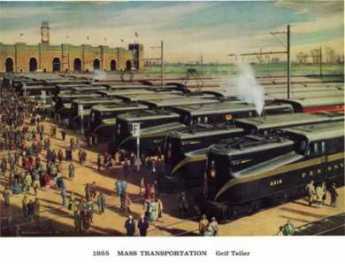
|
| Pennsylvania Railroad |
Originally, the crude oil came from upstate Pennsylvania, near Bradford, and was the main source of the dominance of the Pennsylvania Railroad. Baltimore and New York were also the beginnings of transcontinental railroads, but their freight cars came back empty. The upstate Pennsylvania oil gave the PRR a dominant edge by supplying cargo for two-way revenue.
When George Washington had to retreat from the Battle of Brandywine, the armies had to cross the wetlands, and the river, to get to Philadelphia. Washington got there first and burned the boats after his army got across. He knew, but the British probably did not fully realize, that the first place to ford the Schuylkill was at Norristown. When the British finally got that far, Washington was waiting for them, but a fall hurricane came along and soaked everybody's gunpowder before there could be much of a battle. Unfortunately, Mad Anthony Wayne was unprepared for a nighttime bayonet charge, and there was still quite a slaughter.
You can't wander around John Bartram's house and gardens without getting the impression of considerable wealth. Bartram was interested in botany, becoming the most eminent authority on plants of the Western hemisphere, a very close friend of Benjamin Franklin, and probably the main force behind the creation of the American Philosophical Society. But although Bartram was a hobbyist, he was a shrewd businessman, selling curiosity plants to Europeans, and commercially improved fruits and vegetables to local farmers. There are still some Bartrams around Philadelphia, with a strong Quaker air about them. Around 1850 the place was sold to a zillionaire railroad magnate named Eastwick, who fixed up the place in the high style he learned building the railroads of Russia for the Tsar. The mansion has been torn down, but the stone farmhouse, stone barn, stone sheds, stone outbuildings, stone everything -- endures, like many of the curiosity trees and bushes. Well worth a visit.
Germantown Before 1730
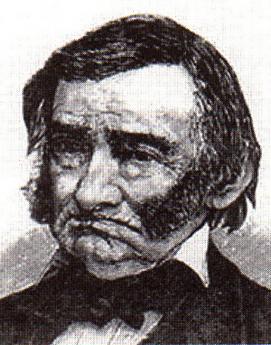
|
| Rev. Wilhelm Rittenhausen |
The flood of German immigrants into Philadelphia after 1730 soon made Germantown, into a German town, indeed. From 1683 to 1730, however, Germantown had been settled by Dutch and Swiss Mennonites, attracted by the many similarities between themselves and the Quakers of England. They spoke German dialects to preserve their separateness from the English-speaking majority but belonged to distinctive cultures which were in fact more than a little anti-German. This curiosity becomes easier to understand in the context of the mountainous Swiss burned at the stake by their Bavarian neighbors, Rhinelanders who sheltered them from various warring neighbors, and Dutchmen at the mouth of the Rhine, all adherents of Menno Simon the Dutch Anabaptist, but harboring many differences of viewpoint about the tribes which surrounded them.
Anabaptism is the doctrine that a child is too young to understand religion, and must be re-baptized later when his testimony will be more binding. In retrospect, it seems strange that such a view could provoke such antagonism. These earlier refugees were often townspeople of the artisan and business class, rapidly establishing Germantown as the intellectual capital of Germans throughout America. This eminence was promoted further through the establishment by the Rittenhouse family (Rittinghuysen, Rittenhausen) of the first paper mill in America. Rittenhousetown is a little collection of houses still readily seen on the north side of the Wissahickon Creek, with Wissahickon Avenue nestled behind it. The road which now runs along the Wissahickon is so narrow and windy, and the traffic goes at such dangerous pace, that many people who travel it daily have never paid adequate attention to the Rittenhousetown museum area. It's well worth a visit, although the entrance is hard to find (try going west on Wissahickon Avenue then turning around, a little beyond the entrance).
Even today, printing businesses usually locate near their source of paper to reduce transportation costs. North Carolina is the present pulp paper source, several decades ago it was Michigan. In the Seventeenth and Eighteenth centuries, paper came from Germantown, so the printing and publishing industry centered here, too. When Pastorius was describing the new German settlement to prospective immigrants, he said, "Es ist nur Wald" -- it's just a forest. A forest near a source of abundant water. Some of the surly remarks of Benjamin Franklin about German immigrants may have grown out of his competition with Christoper Sower (Saur), the largest printer in America, and located of course in Germantown.
Francis Daniel Pastorius was sort of a local European flack for William Penn. He assembled in the Rhineland town of Krefeld a group of Dutch Quaker investors called the Frankford Company. When the time came for the group to emigrate, however, Pastorius alone actually crossed the ocean; so he was obliged to return the 16,000 acres of Germantown, Roxborough and Chestnut Hill he had been ceded. Another group, half Dutch and half Swiss, came from Krisheim (Cresheim) to a 6000-acre land grant in the high ground between the Schuylkill and the Delaware. The time was 1683. The heavily Swiss origins of these original settlers give an additional flavor to the term "Pennsylvania Dutch".
Where the Wissahickon crosses Germantown Avenue, a group of Rosicrucian hermits created a settlement, one of considerable musical and literary attainment. The leader was John Kelpius, and upon his death the group broke up, many going further west to the cloister at Ephrata. From 1683 to 1730 Germantown was small wooden houses and muddy roads, but there was nevertheless to be found the center of Germanic intellectual and religious ferment. Several protestant denominations have their founding mother church on Germantown Avenue, Sower spread bibles and prayer books up and down the Appalachians, and even the hermits put a defining Germantown stamp on the sects which were to arrive after 1730. The hermits apparently invented the hex signs, which were carried westward by a later, more agrarian, German peasant immigration, passing through on the way to the deep topsoil of Lancaster County.
Pennyslvania's Boundary: David Rittenhouse, Hero, Lord Baltimore, Villain
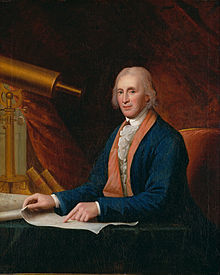
|
| David Rittenhouse |
In the Twenty-first Century, when we know how every American creek and river run, we can see it might have been simple to establish a boundary between the new royal grant to William Penn, and an earlier grant to Lord Baltimore by the then-reigning king's father, Charles I. Essentially: Penn got the Delaware Bay and a lot of wilderness to the west of it. George Calvert, Lord Baltimore, had long held the top half of the Chesapeake Bay and a strip of wilderness to the west of that. Two bays, with two hazy strips of wilderness attached.
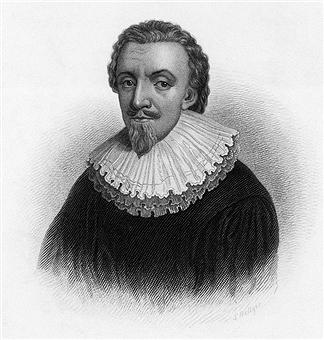
|
| George Calvert, Lord Baltimore |
At what is now Odessa, Delaware, those two bays are only five miles apart; compromise should have settled the issue quickly. Two English gentlemen could have sat down over a pipe and a brew, working something out. However, the English nation was then changing kings, beheading them over matters of religion. A Roman Catholic, Lord Baltimore probably thought an opportunity might emerge from the turmoil if he stalled until matters went his way, since next in line of succession was James, Duke of York, who was a Catholic. But matters fall into the hands of the lawyers when principals of an argument are unable to speak. As we noted elsewhere, in the legal system of the day the last word from the last king was what counted in law courts, accepting any uncertainty about future latest words from future latest kings in order to maintain immediate peace. To lawyers of the time, all this talk about justice, fairness, and geometry was idleness when the nation needed order and stability. So the Calvert family lawyers over the course of eighty years, introduced one specious proposition after another that turned other lawyers purple with rage. Penn's lawyer, Benjamin Chew, beat them at this game, and his mansions in Delaware and Germantown attest to the value attached to this achievement. In other circumstances, posturing might have led to war, as it did in similar disputes with Connecticut. Penn probably knew better, but it takes two to compromise.
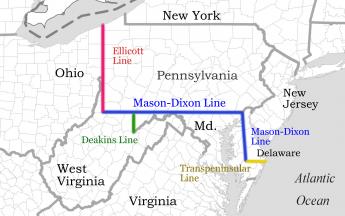
|
| Mason-Dixon Line |
It must be admitted that honest confusion was possible. Sometimes, a line of latitude was a line in the sense Euclid intended: all length and no width. At other times, lawyers and kings were talking about "parallels" as if they were strips, roughly sixty miles wide. If a sixty-mile strip was intended, it was important for a grant to specify whether it extended to the southern edge of the strip, or to the northern edge. But in fact, the state of science in the Seventeenth Century contained uncertainty about both where the strips were, and how wide. And if the grant's language didn't even make it clear whether the parties were talking about strips or width-less lines, eighty years could be a comparatively short time for a court to decide the case. To be fair to Lord Baltimore, many people at the time didn't think these matters were capable of fair solution, so the traditional way of dealing with land disputes was either by force or by craftiness.
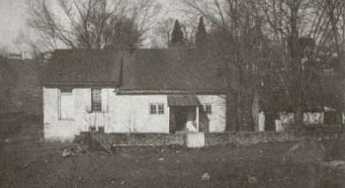
|
| David Rittenhouse Birth Place |
In William Penn the folks from Maryland were, unfortunately, dealing with a friend of the King, who had one of the most brilliant mathematicians in Western civilization as his adviser. David Rittenhouse may have been born in that little farmhouse you can still visit on the Wissahickon Creek, and made his living as a clockmaker, but his native talents in mathematics, astronomy surveying, and instrument construction were so deep and so varied that later biographers are reduced to describing him merely as a "scientist" and letting it go at that. If you want to sample his talents, spend an hour or two learning what a vernier is, and then see if you could apply that insight, as he did, to a compass. So, as it turned out, Rittenhouse was able to describe a twelve-mile circle around New Castle, Delaware, construct a tangent that divides the Delmarva's Peninsula in half, and match it up with an east-west line we now call the Mason Dixon Line. When they finally got around to laying these lines on the ground, Mason and Dixon cut a twenty-four-foot swath through the forest, using astronomical adjustments every night, and laying carved marker stones every fifth of a mile for hundreds of miles. The variation from the line devised by Rittenhouse was at most a fifth of a mile off the mark; the intersection with the north-south line between Maryland and Delaware was less successful. The survey by Mason and Dixon was not quite completed to the Ohio line because the Indians, curious at first, eventually became wild with suspicion at such behavior, particularly the part about going out and aiming cannons at the sky every night. It seems likely that George Calvert, Lord Baltimore, had no more confidence in this madness than the Indians did.
So, the next time you take the train from Philadelphia to Washington DC, reflect that strict reading of the words in the land grants did admit the possibility that your whole trip could either have been within the State of Maryland, or else in the Commonwealth of Pennsylvania, depending on whether lawyers, or scientists, had triumphed in this dispute. Since the Mason Dixon Line later divided not merely two states, but two violently opposed cultures, Rittenhouse must stand out in the history of one of those people who were so smart that most people couldn't understand how smart he was.
State in Schuylkill Fishing Club
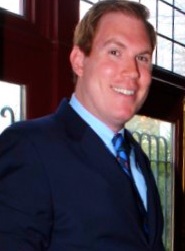
|
| Richard Romm |
Richard Romm, a rising historical scholar with a special interest in early Philadelphia, recently educated the Right Angle Club in the history of the Schuylkill Fishing Club in the State in Schuylkill, and was immediately accepted into membership. Of the Right Angle, that is, which is an old club by some standards, but scarcely a hundred years old in the eyes of the really old, old clubs.
The State in Schuylkill is an eating club, originally a fishing and eating club, apparently organized around the annual shad run up the river. The clubhouse, or Castle, was moved several times, in response to damming of the river, and is now located on the grounds of, or adjoining the edge of, Nicholas Biddle's estate on the Delaware River called Andalusia. One by one, the Atlantic Ocean rivers of America have been dammed and their annual shad migrations brought to an end, except through the city of Richmond, Va, so there was little point in moving The Castle to follow the fish. It remains, overlooking Delaware in spite of its name.
There seems to have been several name changes, the most important of which was to change the Colony of Schuylkill to the State of Schuylkill for obvious reasons. Originally, the Castle was roughly opposite the falls of Fairmount on the West Bank of the Schuylkill at about Girard Avenue; thus, from 1732 to 1822 located on Baron Warner's property called Eaglesfield. In 1822 it moved to Rambo's Rock (the Rambo family is said to be the oldest European settler family in Pennsylvania) opposite Bartram's Gardens, then finally in 1887 to Andalusia, Nicholas Biddle's country estate. The club was founded in 1732, and dates of movings are possibly hazy, possibly somewhat because of the reluctance of club officers to return the calls of inquiring historians. The State in Schuylkill claims to be the oldest organized men's club in the world, an honor contested by White's in London. The roots of this argument are found tangled in the vital issue of whether their age should be based on the formal organization of the clubs, or on the establishment of the coffee houses which housed the original clubs. Four books are said to have been written about club history, but we depend here on Mr. Romm.
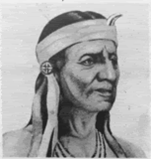
|
| Chief Tammenend |
There is also an unclear relationship with Chief Tammenend, possibly traceable to the shad run, but in any event to the Indian chief depicted with William Penn in the paintings by Benjamin West and Edward Hicks. May 1 is St. Tammany's day, growing into the fancy that he was the "Patron Saint of America", before a branch of the nation-wide Tammany association opened in New York and sort of tarnished up the name. Other traditions of the Fishing club have to do with wearing Mandarin hats, possibly having to do with the export of ginseng which was once abundant in our colonial suburbs, with a return cargo of Chinese dishware. All of the cooking is done by official citizens of the club. The quantities of food are remarkable; one 19th Century menu listed eleven pounds of meat per member. The club drink is a punch, the famous Fishhouse Punch, widely recognized to be rather strong. Its inventor is reputed to be Edward Shippen Willing, on the occasion of the first visit to the clubhouse by women guests. The quantity of alcoholic beverage at these events is especially remarkable in view of the Quaker origins of many original members of the club, but not necessarily of the guests. Among the various guests were Generals Grant, Meade, and McClellan. Dinner begins with two traditional toasts: to George Washington, and to Captain Sam Morris. Washington was appropriate enough, having a history of drinking a bottle of Madeira every day at lunch. But Sam? Captain Sam the Quaker?
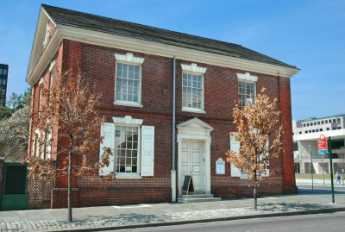
|
| Free Quaker Meetinghouse, Fifth and Arch Streets |
Somewhere in this tradition are allusions to the Free Quakers, Quakers who abandoned the peace testimony to fight the British. There is also the tradition of hostility to British rule which antedates the Revolution and may have some connection to the fanciful contention that their little state was not really part of Penn's colony. Captain (of the City Troop) Sam was a stalwart, possibly the sole founder, of the Gloucester (N.J.) Fox-hunting club. The history is passed down that 22 of the original 26 members of the First City Troop were members of the fox-hunting club, and many if not most were Quakers. The first "Governor" of the State in Schuylkill was Thomas Stretch, but the second Governor, from 1766 until his death, was Captain Sam. He was repeatedly referred to as the life of the club and held in the highest esteem by all. He was "read out" of the main Quaker Meeting, not so much for his drinking as for his flouting of Quaker belief in pacifism. He reputedly led a saber charge at the Battle of Trenton and was a leader of the City Troop in that revolution within a revolution at James Wilson's house, which rescued at least four future signers of the Constitution from a mob of militia which momentarily turned Jacobin.
Naturally, descendants of Quakers on both side of this uproar have been reluctant to say much about it. But somewhere within the history of Samuel Morris must be some important clues about the 18th Century splits within the Quaker Church, to say nothing of the revolt of the three Quaker colonies against British rule.
Religion at Girard College:Spiritual But Irreligious
According to Cheesman A. Herrick, "After Girard had dictated that famous section of his will excluding clergymen and William J. Duane had written it down, Girard asked Duane what he thought of it. Duane, being quite unprepared for the question, and somewhat at a loss to interpret the section, answered, ' I can only say now, Mr. Girard, that it will make a great sensation.' To this Girard replied, ' I can tell you something else it will do -- it will please the Quakers.'"
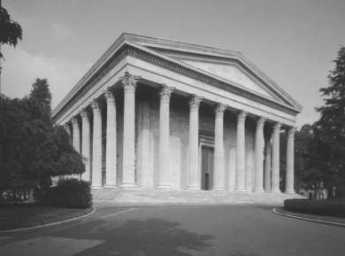 |
| Stephen Girard College Founders Hall |
In the Western part of America, Quaker meetings sometimes do have paid ministers, but the Philadelphia Yearly Meeting and it is component monthly meetings have held steadfastly to the tradition of "unprogrammed meetings"-- without ministers. Girard was not a Quaker, but he greatly admired them, and three of the five executors of his will were Quakers. It, therefore, seems likely, at a minimum, he hoped that Quaker sentiment would fortify his intended banishment of clergymen from his school for orphans, and he might well have got the basic idea from them. Quakers have long noted with disapproval that paid ministers have often publicly supported wars, and Quakers notice that governments waging wars have typically sought to stir up warlike feeling by persuading ministers to help them do so. Another behavior which is almost inherent in the clergy is for ministers to feel that they are measured by the size of the congregation they attract, and hence almost invariably proselytize for new membership. Girard had firm ideas about influencing impressionable orphans, and he did not wish to have outside ideologies capture the administration of the school. 1830 was an evangelical time, and Girard could easily imagine some highly charismatic minister captivating the school.
Other motives may, of course, be imagined. This is what is actually in the will:
Prohibiting any ecclesiastic, missionary or minister of any sect from holding or exercising any station, no such person should ever "be admitted for any purpose or as a visitor, within the premises occupied by the College...I do not mean to cast any reflection upon any sect or person whatsoever, but inasmuch as there are such a multitude of sects, and such a diversity of opinion amongst them, I desire to keep the tender minds of the orphans free from the excitements which clashing doctrines and sectarian controversy are so apt to produce." As matters were to turn out, religious meetings have been conducted by laymen almost every day at the College, and the custom grew up that the boys themselves were often called upon to conduct religious meetings. A great many graduates of Girard College eventually went on to careers in religious ministry, so it even seems likely that their experience at the school had the effect of interesting them in the ministry by giving them a taste of it.
In 1844, the numerous relatives of Stephen Girard tried to break the will. No one has seriously proposed their grievance was anything but financial. However, they sought the services of the most noted lawyer, orator, and statesman of his day, Daniel Webster. Webster would have been wise to refuse to take the case since he could think of no better argument to use than that -- the exclusion of ministers demonstrated the school for orphans was not a true charity, and only a true charity would be allowed to exclude ministers. Several days of oratory enveloped this preposterous argument, which today reads like pure bombast and humbug. The U.S. Supreme Court in time unanimously rejected his brief, with the generous comment that the law was not on his side. Other lawyers have privately remarked that such oratory was never intended to persuade a court, but to impress a rich client.
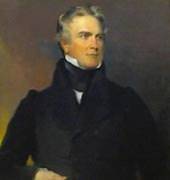 |
| Horace Binney |
Horace Binney, the lawyer son of another Horace Binney who established an enduring reputation for calmness in midst of a religious storm during the Hogan Schism, was the successful defender of Girard College. In contrast with the flowery reverberations of Webster's voice, Binney confined himself to short words in short sentences, sticking strictly to the point without appeal to emotion. In fact, one wonders why Webster stooped to it. Historians credit him for the arguments that later inspired the defenders of the Union with enough conviction to win the Civil War. Essentially, he convinced Unionists that the Constitution had not created a confederacy, but a Union, which implicitly must have all the powers needed to preserve itself. Half the nation would not accept his reasoning, however, and his willingness to proclaim nonsense in the Girard case confirmed many Southern suspicions that the Union argument was also specious. Fifteen years later, Philadelphia was quite slow in coming to the Union side, for a variety of reasons. His attacking a cherished Quaker belief in a Quaker city was certainly not useful. In time, it would be possible to hear a quiet parody of the Union's marching song, that "He died to make men holy -- we will kill to make men free."
 |
| Advice to Young Men and Boys |
It is unfortunate that the one thing most people think they know about Girard College is that religion is excluded. Far from it, there is more attention to morals and ethics than in public schools. Indeed, Girard College compares well with Phillips Exeter Academy, Webster's prep school and perhaps his model. One of the great concerns about orphans is that they may be easily led into a life of crime; there is no doubt that Girard College makes unusual efforts to keep that from happening. In fact, the school may be said to have written its own prayer book during the late 19th Century. Books of devotion were written and then organized by committees of laymen, eventually published by the Chairman, Benjamin B. Comegys. Entitled Advice to Young Men and Boys", Comegys notes that the book was published "in the hope that it may be the means of helping some boys and young men other than those to whom the Addresses were made." It would have to be observed that Girard College inspired an unusual interest in the ministry among the boys, by encouraging them to lead in the ceremonies themselves. And by having the Board of Trustees participate in the construction of books of moral principles, they no doubt similarly evoke a high sense of fidelity within the businessmen trustees. Since those entrusted with huge amounts of money are faced with huge temptations, the Trustees quite possibly need the stimulus as much as the students do.
REFERENCES
| Girard College It's Semi Centennial of Girard College: George P. Rupp ASIN: B000TNER1G | Amazon |
North of Market

|
| Free Quaker Meeting House |
In their 1956 book "Philadelphia Scapple", Harold Donaldson Eberlein and Mrs. Henry Cadwalader give an interesting description of the evolution of the term "North of Market". In the early days of the city, almost all of the town was South of Market Street. In fact, an early 18th Century visitor once wrote that he always brought a fowling piece when he visited Philadelphia because the duck hunting was so good at the pond located at what is now 5th and Market.
When the Quaker meeting house was built at 4th and Arch Streets, many of the more important Quaker families thought it was important to build their houses nearby. In that way, Arch Street developed the reputation of being a Quaker Street. So the original meaning of the North of Market term was the Quaker ghetto. Quaker families continued to spread West along Arch Street or nearby, and this accounts for the location of the Friends Center at 15th and Cherry and related local activities. When the Free Quaker were evicted from the meeting at 4th and Arch because of their activities during the Revolution, they built their own meeting at -- 5th and Arch.
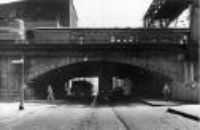
|
| Chinese wall |
During the Civil War, a number of people made fortunes that socially upscale people over in the Rittenhouse Square area considered disreputable, so elaborate but ostracized mansions marched due North up Broad Street, where they can still be observed as stranded whales in the slums, leaders without followers. The show houses of manufacturers of shoddy war goods soon gave the meaning of parvenu to the term North of Market.
And then, the Pennsylvania Railroad ran an elevated brick structure from 30th Street to City Hall Plaza, the so-called Chinese Wall. For nearly a century this ugly looming structure on Pennsylvania Boulevard, now John Kennedy Boulevard, with its smoky engines above, and dark dripping tunnels at street level, sliced the town in half and made it very unattractive to build or to live, North of Market. The Spring Garden area had some pretty large and expensive houses, but it was cut off by the railroad trestle and has only recently started to revive. It helped a lot to tear down the Chinese Wall, but that was fifty years ago, and the area has taken a long time to recover from the earlier diversion of social flow to the South of it. And, psychologically, North of Market will take even longer to recover from the implication of -- industrial slum.
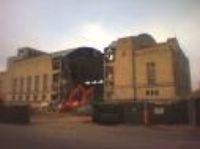
|
| center |
Meanwhile, of course, Oriental immigration settled along Arch Street at 9th to 12th Streets, and we now have our Chinatown there, complete with street signs in oriental lettering. In effect, we have a real Chinese Wall, a social one. Just what will happen to this group is unclear, since it is readily observable that they like to cluster together, unlike the East Indian immigrants, who head for the suburbs as fast as they can. Since the Chinese colony is physically blocked on all sides by the Vine Street Expressway, the Convention Center, and the Ben Franklin Bridge, it is hard to know where they will flow if the group gets much larger. The depressed Vine Street crosstown expressway makes a definitive border for downtown, and the contrast between the two sides of this expressway is striking. On one side is Camelot, and on the other side, almost nothing is being built. The future of North of Market, at the moment, is a little unclear.
The Schools of School House Lane

|
| Union School founded in 1759 |
The region of Philadelphia defined as Germantown is recorded by the last census as having about 50,000 inhabitants today, 40,000 of whom are of the black race. Germantown has always had an unusual concentration of schools of the highest quality, and here on one street alone there are four. School House Lane runs off to the West of Germantown Avenue, and was originally right at the center of town, the center of the action during the Revolutionary War. The most historic of the schools, the Union School founded in 1759, changed its name to Germantown Academy, and more recently picked up and moved to new quarters in Fort Washington. George Washington sent his nephew there, and its building served as a hospital for the wounded in the Battle of Germantown. When Germantown Academy moved out of Germantown, the Pennsylvania School for the Deaf moved into the vacated quarters. This school had been originally founded in 1820, and is one of nearly a hundred special schools for the deaf in the United States, operating as a quasi-public institution for about 170 students. A remarkable thing about all schools for the deaf is the high IQ of their students. Perhaps deaf underachievers are somehow filtered out by the struggle to adapt before they apply for admission, or perhaps there is something about being deaf that makes you smart. In any event, the average SAT scores of students from PSD, like all schools for the deaf, are always in the very highest ranks among secondary schools.
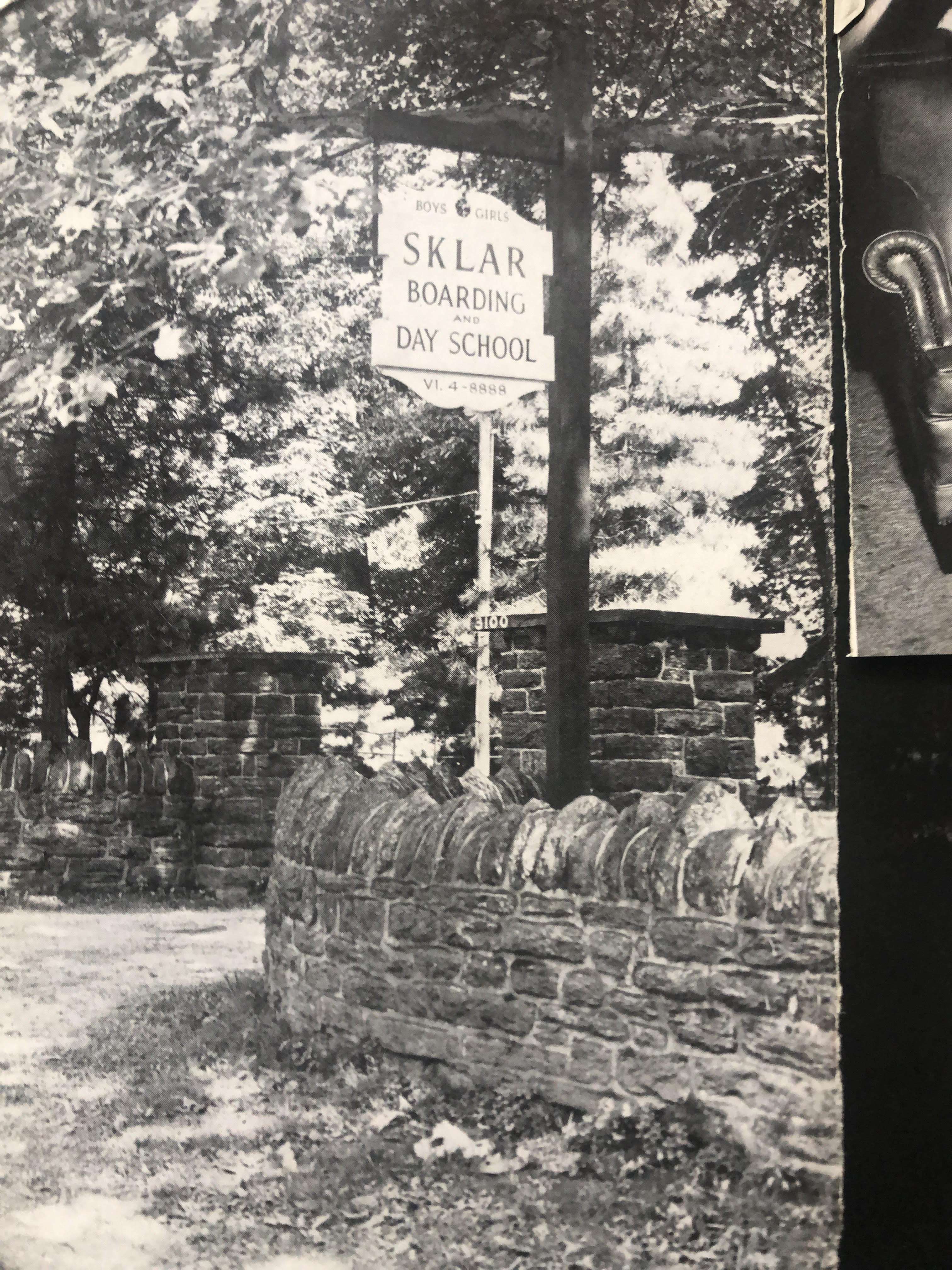
|
| Sklar School Entrance |
More or less next door to it, fronting on Coulter Street, is the Germantown Friends School(GFS), which enjoys and deserves the reputation of the most intellectually rigorous school in the Philadelphia region. There is little question about the Quakers of this school, founded in 1845, but relatively few of the students are now Quaker children. It's pretty expensive and quite uncompromising about its academic standards, but if you want to be accepted by a famous University, this is the place that can boast the most achievement of that variety. By no means all of its graduates become teachers, but alumni of this school do tend to gravitate to the top of academia. That could eventually put them on college admission committees, of course, and perhaps the admission process promotes itself. There can be little doubt that if most of a given college's admission committee happened to play the tuba, that university would soon fill up with tuba players.
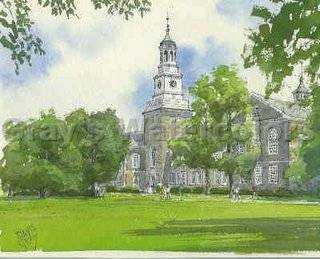
|
| William Penn Charter School |
Further West on School House Lane, is the William Penn Charter School. It's also Quaker, and while it doesn't work quite so hard at it as GFS does, it has plenty of social mission, a great deal more discipline, and plenty of competitive athletics. A minority of its students, also, are Quakers; but as a guess, most of its graduates are headed for disproportionate affluence anyway. The middle school is named for, and was donated by, the former chairman of Morgan Stanley back before Morgan Stanley sold itself to Dean Witter. This school was founded in 1689, and for a long time was located at 12th and Market Streets in Philadelphia, right where the famous PSFS building was built, the one that later converted to Lowe's Hotel .
Finally, near the crossing of Henry Avenue with Schoolhouse Lane, is the Philadelphia University. Since it was founded in 1999 it is the youngest of the schools on School House Lane, specializing in architecture and design, and seems headed for even broader curriculum. The University was formed by the merger of Ravenhill Academy for Girls, and the Philadelphia Textile School. The Textile School was itself formed during the 1876 Philadelphia Centennial, when local industrialists became concerned with how backward America seemed in its quality and design of textiles, compared with other nations which exhibited at that World's Fair. Next door, was once the home of William Weightman, a chemical manufacturer who was reputed to be the richest man in Pennsylvania. After his death, the rather grand estate became the site of the Ravenhill School for Girls, which was the school which could boast Grace Kelly for an alumna. That was natural enough since she lived just around the corner on Henry Avenue and could walk to school. The contrast between the two ends of School House Lane, Henry Avenue on one end, and Germantown Avenue on the other, is just astounding.
So there you have School House Lane. A few short blocks with three distinguished preparatory schools and a university. Plus, the site of three other famous schools which have either moved or merged. You might think Germantown was the home of myriads of school teachers, but that isn't exactly so. It's hard to say just what this complex anomalous situation proves, except to voice the opinion that it is somehow at the heart of what Philadelphia really is.
Note, kind readers have also sent me the names of six more schools on Schoolhouse Lane. Some of them may only be name changes, but the list includes Parkway Day School, Sklar School, Philadelphia Textile and Science, Germantown Stevens Academy, Germantown Lutheran Academy, Greene Street Friends School. (See Comments.)
Billy Penn's Hat
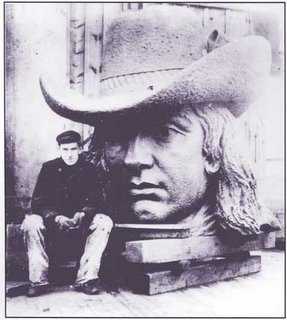
|
| Billy Penn's hat |
Philadelphia City Hall was intended to be the tallest building in the world, so there was no reason to suppose anything in Philadelphia would be taller. Gradually, taller buildings in other cities were built, but there grew up a gentleman's agreement that no skyscraper would be built in Philadelphia that was taller than William Penn's hat atop his statue on the tower of City Hall. Planning in the city was organized around this premise, which affects subways and other transportation issues in the city center. Because of assassination fears, a similar tradition in Washington DC was enacted into law, and it must be admitted that the flat skyline of that city looks a little dumb and boring. But Philadelphia neglected to pass a law, and so at the end of the Twentieth Century first one and then half a dozen skyscrapers were built that were twice the height of City Hall, immediately destroying the organizing visual center of the city. Pity.
But there are more serious issues involved. Aesthetics aside, who cares if someone bankrupts himself building an inappropriately tall building, with excessive elevator costs, problems with reinforced foundations, shortage of parking space, and the like? And the answer to that is the new tall building will bankrupt the older office buildings, not itself. Using offers of low, low rents to fill the new building, tenants will be drained from other spaces, and other areas of the city will deteriorate unless there happens to be a general shortage of office space in the region. Carried to an extreme, all of the center city business might be envisioned to reside in one thousand-story building, and the rest of the region would be a desert.
The obvious response would be that no landlord wants to have competition, and new construction is the way a city renews itself, creatively destroying the old to make room for the new. You must not allow the vested landlords to capture the political process with agitation if not bribes. Push things too far in that direction, and you will find that political corruption has destroyed the fabric of the town more effectively than a couple of skyscrapers ever could. Market East has been devastated, it is true. But that's the price of conducting the commerce of the region on the basis of market economics instead of through bureaucracy which masks corrupt politics with high-flown language. Paris is beautiful, but France has 12% unemployment which is closer to 16% if you remember the 30-hour week, the nine-week vacations, and retirement age in the fifties.
And yet, there is certainly a point to be made here. The height limit on new construction must bear some relationship to the regional need for new office space, and not merely rely on beggar-my-neighbor. We're currently hearing about two new projected skyscrapers, one beside 30th Street Station, and the other at 17th and Market/Chestnut. The decision to go or no-go will rest with whether the developers can find "lead" tenants. The corporate officers of these large enterprises are the ones who must be expected to give careful consideration to the best interest of the community because right now they are the ones who control matters. If they neglect their responsibilities, the pressure to pass more zoning laws will prove hard to resist.
Swarthmore College
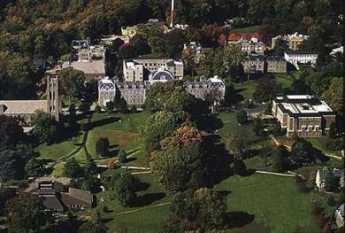
|
| Swarthmore College |
The Friends Association for Higher Education lists 17 American institutions as Quaker Colleges, Universities, or Study Centers. Four of these, Swarthmore, Haverford, Bryn Mawr and Pendle Hill, are located in the Philadelphia region. Until Haverford College recently adopted co-education, it was once possible to say Haverford was all-male, Bryn Mawr was all-female, and Swarthmore co-ed; Pendle Hill has no undergraduates. That greatly oversimplifies a very distinctive set of complexities, however. Since there is no official connection between the colleges and the church, it is a little hard even to explain the sense in which they are truly Quaker, which is by operating under a strong striving for consensus.
Swarthmore is commonly said to be the most Quaker of the three undergraduate colleges, but only 7% of its students are Quaker and only a quarter of its trustees. The most distinctive feature of the college is the so-called Honors Program, patterned after the tutorial system of Oxford and Cambridge, which was brought there in 1921 by a non-Quaker president who had experienced the system as a Rhodes Scholar. The establishment of this program was heavily supported by the General Education Board, which is to say the Rockefellers. As a reflection of the pressures of graduate schools, and possibly student preference for a greater variety of subject material, only about a third of the students elect to take the Honors Program. It is, however, the central core of the college.
The name of the college derives from Swarthmore, which was the English home of George Fox, the founder of Quakerism. Early Quakers were uncomfortable with the colleges and universities of their day, which had been founded to educate priests and ministers of various other religions, gradually enlarging their mission to include the children of upper-class families. The motto of Eton College embodies much that made Quakers wince: "Eton exists to exert a civilizing influence upon those who are destined to rule." Even the American variation of that there is scarcely an improvement since it would probably say something along the line of offering the opportunity to increase the student's future life income by 70%. It is easy to understand why Quakers wanted to have their own school system, protecting their children from attitudes and influences they disapproved of. Although the Civil War somewhat disorganized the early directions of Swarthmore, for fifty years it was a simple rural college, aimed at avoiding modern influences more than seeking a defined unique role. And then along came Frank Aydelotte.
Very likely, a major appeal underlying the Oxbridge seminar system to Aydelotte and the Quaker trustees was its modern evolution into a model for producing those unusually talented and incorruptible civil servants, who really run the British government under the nominal control of elected officials. Such ambitions necessarily imply a need to attract unusually bright students, and Aydelotte's method was to keep the student enrollment smaller than a well-financed faculty could attract. Unfortunately, as brighter non-Quaker applicants were attracted, more and more Quaker applicants had to be rejected. By 1953, the incoming new president, Courtney Smith, was prompted to make the rueful observation, "Franklin Roosevelt's record at Harvard, and Adlai Stevenson's at Princeton, and Dwight Eisenhower's at West Point, were scarcely, I am told, pace-setting." Almost every American college now faces something like the same conflicted feeling, since globalization implies that all Americans, not merely Quakers, might someday be excluded from their own colleges in order to make room for, say Orientals, who are brighter. Remaining small, however, Swarthmore does have the latitude to seek its own solutions, one of which has been to create the pre-eminent scholarly center for the study of Quakerism.
There are other quiet paradoxes atSwarthmore. From rural simplicity to suburban elegance, the physical transformation of the campus made possible by generous funding might distress only a Quaker. Indeed, Arthur Hoyt Scott of the class of 1895 donated 330 acres of ornamental garden in 1929, composed of beautiful ornamental plants, that no matter what their origin would thrive in the Delaware Valley. Not only is this garden a premier place to visit, but it is also one of the inspirations along with Longwood and Bartram's Gardens for landscaping of the entire Mid-Atlantic region.
And then there is the subsequent history of Frank Aydelotte. True, after he left Swarthmore he became a Quaker, himself. But he left to implement the educational ideas of Mr.Bamburger the department store magnate at the new Institute for Advanced Study in Princeton. That is, at that unquestionably pre-eminent intellectual center whose main achievement so far has been the development of, the atom bomb.
REFERENCES
| Swarthmore College: An Informal History: Richard J. WaltonASIN: B0006ELCO8 | Amazon |
Gardening Survives
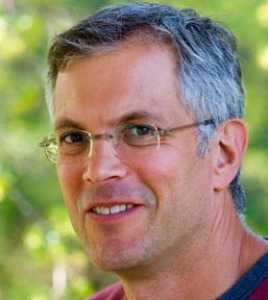
Adam Levine, the author of a new book about the Philadelphia public garden scene was recently the featured guest speaker at the Franklin Inn. He's a charming person, and has given us a great book.
He draws to our attention that the Philadelphia region is pre-eminent in the garden world, and has been so for several centuries. While it is true that Philadelphia has a mild enough climate to be suitable to two climate zones, the early settlers came from a region of middle England that has been a garden center since Roman times. And they were Quakers, uncomfortable with the outward show in buildings and furnishings, but flowers were innocent instruments of the display. Although Chanticleer was created by a Pennsylvania German family, the great centers of public gardens are mostly traceable to the influence of Quakers, and the du Pont family. Since one or two years of neglect will ruin almost any garden, the essence of great gardens lies in the ability to survive.
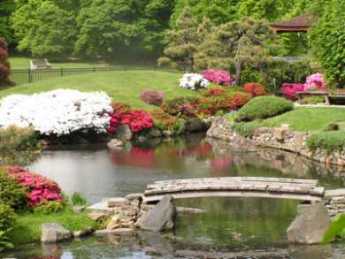
|
| The Horticultural Society |
In fact, the Philadelphia area contains hundreds of gardens which have decayed and virtually disappeared. The Horticultural Society is at the heart of garden preservation, financed in large part by the annual flower show, but even that thriving organization is hard pressed to do justice to the vast areas that need tending. Woodlands would be an example of an area needing tending, and Friends Hospital is an object lesson. When that venerable institution was sold to sharp pencil types from out of town, the Azalea gardens on the grounds were closed to visitors, except for two hours a year. It makes you tremble to imagine how long this famous azalea collection will probably survive. Meanwhile, Germantown's famous gardens are maintained in a minimal way, stretching the resources of the owners who have more urgent demands to meet in their buildings and furniture. Indeed, it is hard to name a really outstanding garden within the city limits, with the exception of the Morris Arboretum, which barely makes it within city boundaries. The area back of the Art Museum along Boathouse Row makes a brave attempt in the spring, but it's a pale reminder of the glory which used to be seen in East Fairmount Park, especially at Lemon Hill, Stenton, and Cliveden. Stotesbury is just a relic.
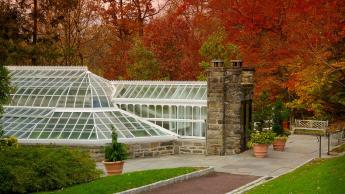
|
| Morris Arboretum |
Gardens have moved to the suburbs. Chanticleer, the Morris Arboretum, Longwood Gardens, Nemours, the Scott Arboretum at Swarthmore, West Laurel Hill, The University of Delaware in Newark, Cabrini College in Villanova, Haverford College Arboretum, Temple University's Ambler campus, and the Trenton Sculpture Gardens on the old fairgrounds -- all would demand mention in any list of outstanding gardens in America. But only a few of them aspire to the standards of an outdoor sculpture garden, where the goal was to surround each piece of sculpture with a garden in such a way that only one sculpture could be seen at a time. Now, that was gardening on the grand scale.
Hidden in a regional garden scene is the seed merchants, starting with John Bartram and famous under the Burpees, which make gardens possible. After all, there has to be a place to find these things. Perhaps the catalog stores, like Wayside Gardens, are the hope for the future. Every shrub or tree transported from a nursery takes up a ball of topsoil along with the specimen, and the appearance of nurseries around the periphery of a city is usually the first step in the development of housing projects. If there is an investment of topsoil in every garden, perhaps we ought to think a little bit about the way we let the investment dry up and blow away.
REFERENCES
| Gardens of Philadelphia and the Delaware Valley William Klein Jr. ISBN-10: 1566393132 | Amazon |
Hidden River
.jpg)
|
| Schuylkill River |
In Dutch, Schuylkill means "hidden river", thus making it redundant to speak of the Schuylkill River. As soon as you become aware of this little factoid, you start to come across Philadelphians who do indeed speak of the Schuylkill in a way that acknowledges the origin of the term. To give it emphasis, it is common to speak of the "Skookle". The point comes up because cruises have started to leave from the dock at 24th and Walnut Streets, where it becomes quite noticeable that the Schuylkill really is rather hidden as it winds seven miles south to the airport, in contrast to the wide-open vista we all are accustomed to seeing from the Art Museum northwards.
The bluff at Gray's Ferry, where the University of Pennsylvania's new buildings now dominate the scene, was originally the beginning of dry land, or the end of the rather large swamp, through which the river winds its way essentially shaded by trees along the riverbank. Never mind the junkyards and auto parks you happen to know lurk behind the trees on the west side or the oil tanks which loom above the trees on the south bank. As evening closed in on the riverboat, the gaily lit towers of center city were looming in the stern, but some fishermen along the bank proudly held up a respectable string of six or seven rather large catfish. If you are there in the evening, the river has the same feeling of wilderness that the Dutch traders would have experienced three hundred years earlier. No swans, however. There were many reports in the Seventeenth Century of large flocks of swans sailing around the entrance of the Schuylkill into the Delaware River. A noted local ornithologist on the recent cruise remarked that forty or fifty species of birds are found there. Even a flock of owls still live within the city limits. You don't see owls, even if you are an ornithologist; their presence is made known by taking recordings of the sounds of the night.
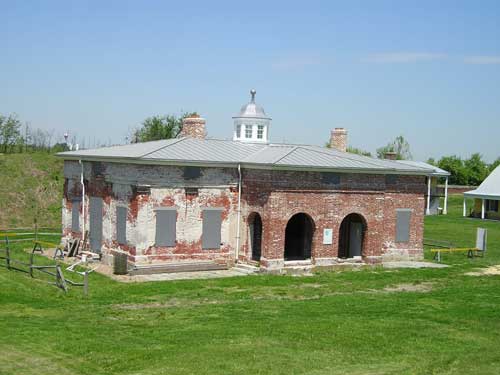
|
| Fort Mifflin |
The geography of swampy South Philadelphia was created by the abrupt bend in the Delaware River at what is now thought of like the airport region. As the river flows at the bend, sediment is deposited in mud flats that once created Fort Mifflin of Revolutionary War fame, and later Hog Island of the Naval Yard, home of the hoagie. Swans are beautiful creatures, but they seem to like a lot of mud. The lower Schuylkill is tidal, and the industrial waste of the region is cleaned out of the land by cutting drainage ditches laterally from the river, flooding the lowlands as the tide rises, and draining it again as the tide falls. This cleansing seems to be working, as judged by the return of spawning fish. And maybe mosquitos, as well, but it would seem rude to inquire.
The Bartram family seems to have known how to make use of river bends and riverbanks, placing the stone barn and farmhouse higher up the bank, but below the bluff of Gray's Ferry forces a bend in the Schuylkill, below which of course flatlands were created. It's a peaceful place, now made available for tours and excursions by placing a landing dock on metal pilings so that it can ride up and down with the tides. The great advantage is that riverboat landings are no longer restricted to two a day, at high tide, with limited time to visit before the tide falls again. Bartram recognized how popular strange plants from the New World would be in England, and his exotic plants were quite a commercial success. Nowadays the big sellers are Franklinia Trees, available the first week in May. The last Franklin (named of course for his friend Benjamin) ever found growing in the wild, was the one John Bartram found and nurtured. Every Franklinia is thus a descendant of this one. They look rather like dogwood but bloom in the early fall. If it suits the fancy, a dogwood next to a Korean dogwood which blooms in June, next to a Franklinia, can make a continuous display of bloom from May to October. And best of all, no one will appreciate it, unless they are in the know.
18 Blogs
Pennsbury Manor
 The Delaware River takes an abrupt right turn at Trenton, creating extensive wetlands for miles around. Whatever its environmental drawbacks, the river delta is moving toward landfill and "development". Come back in fifteen years and be amazed.
The Delaware River takes an abrupt right turn at Trenton, creating extensive wetlands for miles around. Whatever its environmental drawbacks, the river delta is moving toward landfill and "development". Come back in fifteen years and be amazed.
WILLIAM BLATHWAYT'S DRAFT OF THE CHARTER OF PENNSYLVANIA
William Blathwayt was clerk of the British Board of Trade. His draft of Penn's charter for Pennsylvania was essentially a staff proposal for the King to sign. It conforms to the final charter in all but minor wording [,punctuation, and emphasis marks].
The Naming of Pennsylvania
 King Charles gave Penn as much land as the whole of England, and named it after William Penn
King Charles gave Penn as much land as the whole of England, and named it after William Penn
William Penn Conducts a Witchcraft Trial
 A public official has to obey the law, and conform to the traditions of his office, even if it is obvious that he thinks the whole thing is silly and unfair.
A public official has to obey the law, and conform to the traditions of his office, even if it is obvious that he thinks the whole thing is silly and unfair.
William Penn: Visionary with Persuasiveness
 Even when we know how it eventually turned out, it is hard to imagine how William Penn would dare to suppose the King might give him Pennsylvania, and even harder to understand how he managed to negotiate the agreement.
Even when we know how it eventually turned out, it is hard to imagine how William Penn would dare to suppose the King might give him Pennsylvania, and even harder to understand how he managed to negotiate the agreement.
Foot of Arch Street

Glorious Revolution: Nov. 5, 1688
 William of Orange triggered three centuries of Irish conflict, more than a century of conflict between England and France, and spoiled the fortunes of William Penn. American history scarcely heard of him.
William of Orange triggered three centuries of Irish conflict, more than a century of conflict between England and France, and spoiled the fortunes of William Penn. American history scarcely heard of him.
John Bartram's Garden
 Bartram's farm dates back to the earliest days of Philadelphia, and it's still much the same farm, right in the midst of urban.
Bartram's farm dates back to the earliest days of Philadelphia, and it's still much the same farm, right in the midst of urban.
Germantown Before 1730
 The early German settlers of Germantown were religious intellectuals, with a Swiss background and a history of religious martyrdom.
The early German settlers of Germantown were religious intellectuals, with a Swiss background and a history of religious martyrdom.
Pennyslvania's Boundary: David Rittenhouse, Hero, Lord Baltimore, Villain
 Because a local genius invented and perfected surveying instruments, America is one of the few nations in the world with straight-line boundaries.
Because a local genius invented and perfected surveying instruments, America is one of the few nations in the world with straight-line boundaries.
State in Schuylkill Fishing Club
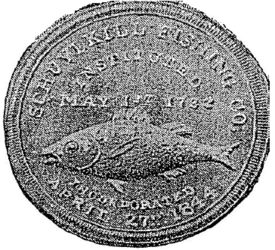 Unless you listen to some quibbles from White's in London, the Schuylkill Fishing Club of the State in Schuylkill is the oldest organized men's club in the world. And even if that exception is admitted, it's the oldest men's club in America. It's no secret, but it's very private.
Unless you listen to some quibbles from White's in London, the Schuylkill Fishing Club of the State in Schuylkill is the oldest organized men's club in the world. And even if that exception is admitted, it's the oldest men's club in America. It's no secret, but it's very private.
Religion at Girard College:Spiritual But Irreligious
 In his will, Stephen Girard famously banished all clergymen from the grounds of his school for orphans, even as visitors. Nevertheless, the school's atmosphere is a highly ethical, even religious, one. Many graduates have become ministers.
In his will, Stephen Girard famously banished all clergymen from the grounds of his school for orphans, even as visitors. Nevertheless, the school's atmosphere is a highly ethical, even religious, one. Many graduates have become ministers.
North of Market
 This old local expression originally pointed to where the Quakers live on Arch Street, but over the centuries has taken on a lot of less flattering associations.
This old local expression originally pointed to where the Quakers live on Arch Street, but over the centuries has taken on a lot of less flattering associations.
The Schools of School House Lane
 Exclusive privates schools and colleges are usually to be found in isolated rural settings. But our oldest, best, and most famous schools are clustered together in a neighborhood that is far from exclusive.
Exclusive privates schools and colleges are usually to be found in isolated rural settings. But our oldest, best, and most famous schools are clustered together in a neighborhood that is far from exclusive.
Billy Penn's Hat
 There was a gentleman's agreement not to build higher than the top of City Hall, but business is business.
There was a gentleman's agreement not to build higher than the top of City Hall, but business is business.
Swarthmore College

Gardening Survives
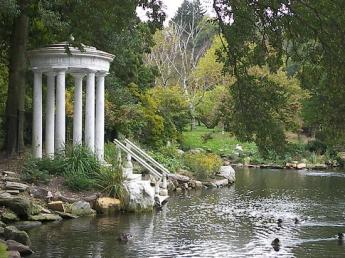 A new book has arrived, describing the 90 great public gardens of the Philadelphia regions, and discussing the best 40 of them in detail.
A new book has arrived, describing the 90 great public gardens of the Philadelphia regions, and discussing the best 40 of them in detail.
Hidden River
In season, and for benefits, cruises of the Schuylkill are starting to be available at the Walnut Street dock. Go down the stairs at 24th Street.